I have no intentions in ceasing my castigation until my mission is successfully executed.
PLEASE TAKE NOTICE: I FORMALLY REQUEST THE DETROIT FREE PRESS ISSUE A CORRECTION THAT THESE HOUSES ARE "GOVERNMENT" OWNED. THE DETROIT LAND BANK AUTHORITY IS NOT A GOVERNMENTAL ENTITY, NOT CITY, NOT COUNTY, NOT STATE, NOT FEDERAL, AND IS NOT INCORPORATED.
In the spirit of fuchsia...
Dead bodies, wild dogs, squatters in government-owned Detroit houses <===please present your proofs that these houses are government owned and identify, with instruments of authority, of which government. Otherwise, this is propaganda.
THE DETROIT LAND BANK AUTHORITY'S PROBLEM WITH UNAUTHORIZED OCCUPANTS IS LIKE NO OTHER IN THE NATION BECAUSE IT NEVER INCORPORATED
They stole the children, the land and the votes.
The Detroit Land Bank owns nearly 30,000 residential structures in the city. As many as 4,300 of them are occupied by squatters.
Calling someone a squatter is a legal determination. Since this writer wishes to promote propaganda covering up the complex financial fraud schemes of the Detroit Land Bank Authority, et al, then in similar fashion, I shall come up with my own psuedo-legalese and call them "Fraudfeasors"!
They stole the children, the land and the votes.
At one end of Alpine Street, near Joy Road on Detroit's west side, Georgeia Elder and a friend live in a leaky trailer, their yard cluttered with a boat and a Cadillac Escalade with four ladders on the roof, a shopping cart and a lawn mower, a folding chair and a metal headboard. A pit bull, Lady, laps up spaghetti and gravy from a takeout container.
At the other end of this short stretch of Alpine, near Tireman Avenue, a woman known as Spankie lives in a house with a dog she calls "my baby." A heart-shaped sign hangs from the front door that says "Bless Our Home." A handwritten sign instructs the postal carrier to put her mail in a box tucked into a milk crate next to the porch stairs. A scent of straw and animals hangs in the air.
These occupants don't own the properties where they live. They're not paying rent to the owner either.
They live there because the Detroit Land Bank Authority ran a bogus property tax foreclosure fraud scam through the City of Detroit and Wayne County, to file fake quiet titles and generate fake quit claim deeds and are too poor to go anyplace else.
Their homes on Alpine Street, a Free Press analysis shows, bookend one of the City of Detroit's highest concentrations of squatters, people who live in homes owned by the Detroit Land Bank Authority.
Oh, "Those Squatters" (said with disdain).
They live there because the Detroit Land Bank Authority ran a bogus property tax foreclosure fraud scam through the City of Detroit and Wayne County, to file fake quiet titles and generate fake quit claim deeds and are too poor to go anyplace else.
Their homes on Alpine Street, a Free Press analysis shows, bookend one of the City of Detroit's highest concentrations of squatters, people who live in homes owned by the Detroit Land Bank Authority.
Oh, "Those Squatters" (said with disdain).
There are as many as 4,300 houses just like these across the city.
The Detroit Land Bank owns nearly 30,000 residential structures in the city. As many as 4,300 of them are occupied by squatters.
Calling someone a squatter is a legal determination. Since this writer wishes to promote propaganda covering up the complex financial fraud schemes of the Detroit Land Bank Authority, et al, then in similar fashion, I shall come up with my own psuedo-legalese and call them "Fraudfeasors"!
Many squatters once were the homeowners, but lost the houses to foreclosure of a property tax fraud scheme. Others simply broke in and stayed having lost their home to the Detroit Land Bank Authority for not paying fees, of which the term "fee" does not start with a "t" like the word "tax". Along this four-block stretch of Alpine, squatters occupy 20 land bank properties, according to its records. Do the Detroit Land Bank Authority records match the records of the Wayne County Register of Deeds? You should really check.
Ordell and Wardell Belt, twin brothers in their 60s, live in a small frame house without water or heat, but they have a pup, Scandalous, chained up outside for protection. Wardell did time in federal prison for armed bank robbery; Ordell said he was shot by police as a teenager and is too embarrassed today to describe what happened, other than he regrets what he did.
Poverty makes people do strange things to stay alive.
Poverty makes people do strange things to stay alive.
The twins have lived on Alpine most of their lives, and Ordell once owned their house.
More:
> The Free Press finds an actual working business that is squatting
> This guy grows these plants on acreage he doesn't own
> Solutions: Other places head off squatters before they're a problem
> Here's how the Detroit land bank counts this elusive population
> The Free Press finds an actual working business that is squatting
> This guy grows these plants on acreage he doesn't own
> Solutions: Other places head off squatters before they're a problem
> Here's how the Detroit land bank counts this elusive population
LaVerta Washington also lives on Alpine, next to a scorched house and across from a skeleton of another house. She cries about the uncertainty of living in a place she doesn't own, and prays she can stay in the bungalow, decorated with pinwheels and flower baskets, wind chimes and an American flag, until she dies.
If nothing is done with the Fraudfeasors of the Detroit Land Bank Authority, she will die sooner than she thinks.
If nothing is done with the Fraudfeasors of the Detroit Land Bank Authority, she will die sooner than she thinks.
Aquin Hill took over a vacant land bank house three years ago, adopted it as her own and recently bought it for $1,000 under a program called "buyback." She doesn't need a car to visit family, who live nearby on Alpine, too, or to go to the corner store.
Welcome to the worst squatter problem in the nation and welcome to the operations of the largest fraud scheme committed against the people of the United States in the pilfering of the U.S. Treasury through TARP, the Hardest Hit Funds.
The Detroit Land Bank owns nearly 30,000 residential structures in the city, and with as many as 4,300 of them occupied — it's a magnitude unlike any other place because they were stolen, through the courts, under the Ham Sandwich called the Fraudfeasors of the Detroit Land Bank Authority because they never incorporated and are not part of the City of Detroit, or any other government.
Squatters are a tricky problem: remove them and add to the city's homeless population and its massive inventory of abandoned buildings. Let them stay, and the land bank is summoned often to investigate what some of its occupants may be up to: dog fighting, prostitution, drug dealing, overdoses, gambling, gun possession or running a chop shop.
The only reason "Those Squatters" (said with disdain) cannot be evicted is because the Fraudfeasors of the Detroit Land Bank Authority never incorporated, but they did try and use the Black Caucus Foundation of Michigan to do their dirty deeds, but got busted.
The only reason "Those Squatters" (said with disdain) cannot be evicted is because the Fraudfeasors of the Detroit Land Bank Authority never incorporated, but they did try and use the Black Caucus Foundation of Michigan to do their dirty deeds, but got busted.
Detroit police also are called regularly to land bank properties to investigate dead bodies — at least 50 homicides over the last four years.
In one case, remains were found in a garbage can in a garage. At another house, police found the bodies of a mother and her 4-year-old daughter stashed in a basement.
Since Mayor Mike Duggan took office in 2014, the Detroit Land Bank has taken in thousands of foreclosed properties, demolished blighted houses and auctioned others. The land bank has also tried to solve its squatter problems but progress has been slow....due to the inconvenience of the SIGTARP & DOJ OIG investigations.
A Free Press investigation finds:
- The land bank has turned only a fraction of its occupants into homeowners, and has only two initiatives to make that happen. 1. You stand up and challenge the Fraudfeasors of the Detroit Land Bank Authority, or, 2. You hold your breath, sign their fraudulent paperwork, because they never incorporated so they cannot enter into legal contracts, and pray the Fraudfeasors of the Detroit Land Bank Authority to do not run another bogus property fee tax scheme or file another fake quiet title action through fake reconveyance paperwork, while you go back on the ramen noodle diet to make the payments to bring the house up to code, since you cannot get any financial assistance due to the majority of the deeds being so jacked up no financial institution will accept the paperwork.
- The land bank treats its squatters inconsistently. Some are allowed to stay after the land bank finds them, others are pushed out....depending on if the Fraudfeasors of the Detroit Land Bank Authority have taken out fake secondary or tertiary mortgages on the specific properties in question.
- The land bank doesn't have the money to maintain and secure all 30,000 of its residential structures, so neighbors have taken on the job of keeping squatters out of some of these houses....because that money that was supposed to be for blight to do things like board up the structures is being used to pay the legal fees of Jeannie Rhee's replacement.
- The land bank's estimates of its squatter population are a moving target. Erica Ward Gerson, chair of the land bank authority, said the number is somewhere between 3,400 and 4,300...but that number does not include trafficked children nor does it take into consideration the seasonal effect of attrition. People tend to die when they have no heat or water.
- Other land banks and cities avoid squatter problems by preventing them in the first place. They either evict illegal occupants or refuse to take possession of occupied houses...because other land banks incorporated. See how that works?
Life as a squatter is a struggle: Some are extremely poor, their only income a federal disability check.
Some have no heat or water...and the Fraudfeasors of the Detroit Land Bank Authority do not really care about "Those Squatters" (said with disdain).
Some have no heat or water...and the Fraudfeasors of the Detroit Land Bank Authority do not really care about "Those Squatters" (said with disdain).
The squatter population includes people who have jobs, senior citizens and parents with children.
They mow their lawns, plant flowers, keep their lots tidy.
They mow their lawns, plant flowers, keep their lots tidy.
There also are ex-cons, drug or alcohol abusers and mentally ill people. Some can't work.
Some are even humans. The writer failed to assert this fact.
Some are even humans. The writer failed to assert this fact.
On Quincy Street, several miles north of Alpine's concentration of squatters,there's the mother and her four young sons, whose land bank house is next to a vacant commercial parcel with a population of foxes and piles of discarded tires. The smell of rubber drifts to her front porch, and she hears the foxes' high-pitched yelping. Something, at one point, killed their dog. The mother and the boys blamed the foxes, but a state Department of Natural Resources official said a feral dog attack is more likely.
Life isn't easy for the squatters' neighbors, either, those who do pay their taxes, rent or mortgage. They live next to overgrown lawns, yards stuffed with boats, cars and junk, and chained, barking dogs. And, for one neighbor, the stench of a decaying body in the grass behind a land bank house.
Perhaps, if the Fraudfeasors of the Detroit Land Bank Authority did not run a complex financial & tax fraud scheme on the properties of Detroit, then, maybe, there would not be any of "Those Squatters" (said with disdain).
Perhaps, if the Fraudfeasors of the Detroit Land Bank Authority did not run a complex financial & tax fraud scheme on the properties of Detroit, then, maybe, there would not be any of "Those Squatters" (said with disdain).
No responsibility
Gerson, the land bank chair, said it has no responsibility for its occupants....because it never incorporated.
"They're not renters. They're occupying homes that they don't own." and neither do the Fraudfeasors of the Detroit Land Bank Authority because the properties were leveraged through lumped trademarks of Corporate Shape Shifters.
Gerson said the land bank also does not have a policy on whether to allow people to live in its properties....because it never incorporated.
But U.S. Rep. Dan Kildee, D-Flint Township, said Detroit's land bank must find a way for its occupants to reside in their houses legally, and if that’s not possible, vacate the premises “because the gray area is really dangerous and the properties often are not up to code for occupants to live in them." and it would be quite the embarrassment for the Fraudfeasors of the Detroit Land Bank Authority to have someone sue them in a court of law, where they unable to submit to the court its corporate parent disclosures because it never incorporated, which would make the City of Detroit, Wayne County, and the State of Michigan, liable to litigation, but not the United States because there is a convened grand jury going on.
“Without legal occupancy, they can’t get water, they can’t get utilities. Ooooo weeee, I know what it is like trying to get utilities turned on to a property with a jacked up deed from the Fraudfeasors of the Detroit Land Bank Authority. I had to go incorporate the Detroit Land Bank Authority to get my utilities on, but that made Bill Schuette all mad and stuff, then made me dissolve it, then called me a public nuisance, then I snitched on him for his fake deeds he turned into the court, then...well... we have to see how that plays out. What you end up with then is the most dangerous situation — people hijacking neighborhood utilities, especially in the winter, which is dangerous to occupants and the neighborhood." When you know CPS is going to snatch your kids, you will be surprised what a mother will do to survive with her kids after surviving the barbarious attack of being forced into poverty and forced into migration.
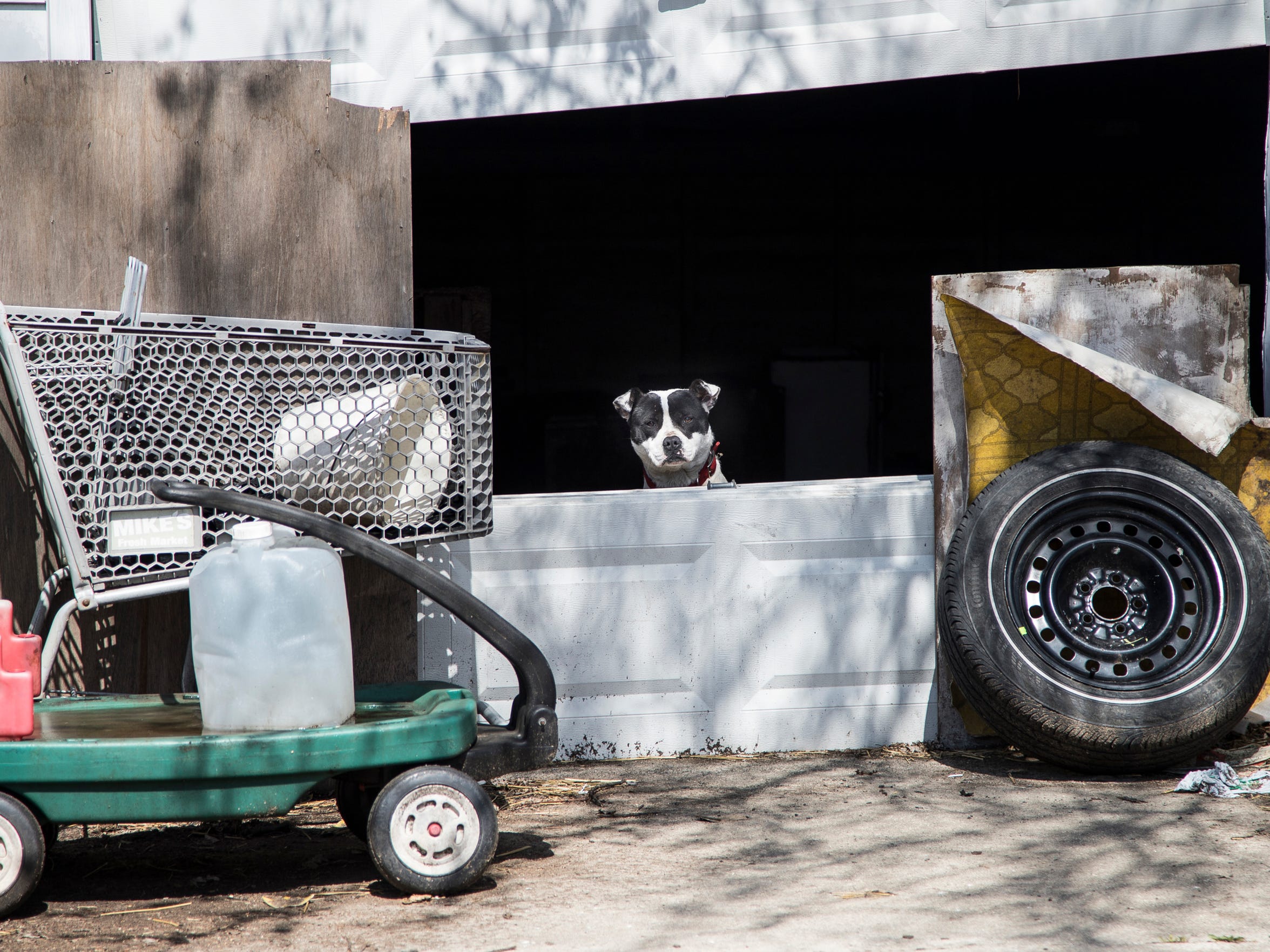 |
| Bullet, a dog belonging to a man squatting in a house on Fairmount Drive in Detroit, looks out from the garage in April. (Photo taken April 5, 2018) |
The Free Press found the Detroit land bank is inconsistent in how it deals with its squatters. Some are removed from the houses they've taken over, but not others...because the others challenged the Fraudfeasors of the Detroit Land Bank Authority.
In 2017, for example, the land bank found a man, who had been living in one of its houses for three years, using illegal electricity and a woodburning fireplace for heat. His daughter told the land bank he was using and distributing crack cocaine, but the land bank decided that while the allegations were serious "they are simply allegations," records show.
The occupant admitted to using marijuana, which the land bank does not allow in its properties. But it didn't run him off.
Another occupant of a different house could not provide any proof to land bank investigators that she had been a legitimate renter, and despite its own notes that the situation "seems suspect," the land bank let her stay, according to a summary of its 2017 investigation into the matter.
Then there were the squatters in a house on Forrer Street near Dearborn. Neighbors complained to the land bank about them for more than a year in phone calls and emails.
One called it a "house of blight" with five cars in the backyard and grass up to the fence line, according to an email to the land bank in November 2017.
The Free Press obtained the correspondence through an open records request. The land bank blacked out the names of the letter writers....because it is not incorporated and does not have to adhere to any civil rights law, or any other law, well, perhaps, international law, considering that its assets are up bundled and leveraged in trademarks.
In a June 2017 email, a neighbor said the occupants were "working on cars in the driveway and selling them. Right now, they are sanding a car down to prep for paint in the driveway. The lack of management of your property and accountability is so unprofessional and wrong."
Another neighbor reported seeing residents of a house on the block "summarily" move into the Forrer property in summer 2016. "It was clear this was an illegal entry as they were observed moving in furniture late at night, running extension cords from house to house to steal electricity, etc. Thus began a pattern of unsightly and dangerous developments, which continue to the present day."
Among one neighbor's concerns: bonfires on the front lawn, loud parties, screeching tires, and car repair and resale business at the house. The neighbor said the occupants had chipped at the curb with sledgehammers to make room for a bigger driveway.
"They have cemented half of the front yard," a neighborhood resident of 22 years said in a handwritten note. "Flat bed trucks come in + out dropping off cars. ... They drag race up + down Forrer. ... The backyard is nothing but cars, trash + dog waste."
And what did the land bank do? It's selling the house to the occupants for $1,000.
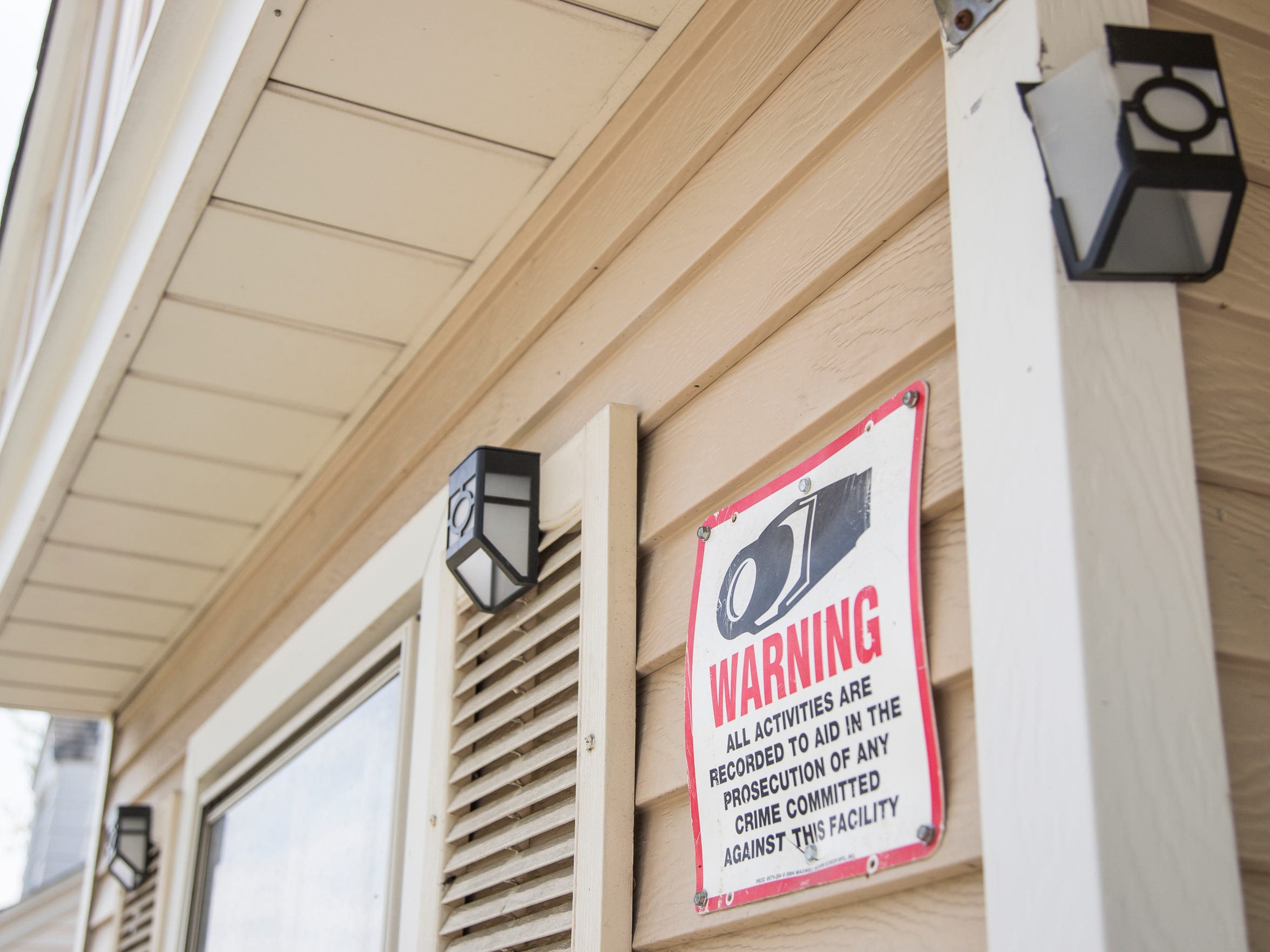 |
| Surveillance cameras and a warning sign at a house in the 6300 block of Forrer. (Photo taken May 17, 2018) |
They need to dump these houses to anyone with the cash. Gotta pay those legal bills, you know.
The Free Press visited the house multiple times, but no one came to the door. The exterior of the house has three security cameras and a warning sign that says: "All activities are recorded to aid in the prosecution of any crime committed against this facility."
The land bank said the situation was simply a disagreement between neighbors that it could not resolve.
Sources familiar with the land bank's practices, who requested anonymity for fear of reprisals, said it often decides what to do with its squatters based on the location of the property. Squatters are told to get out when a neighborhood can attract new development or the house can attract a buyer. But they're left alone in the forgotten corners of the city.
The Free Press presented the allegations to the land bank, and in a written response, the authority said it removes occupants for two reasons: illegal activity or when the occupant does not qualify for the buyback program. Location, the land bank said, is not a factor.
Since 2014 through May, the land bank has filed a total of 82 eviction cases....NOTE TO SELF...Pull those addresses and see who filed as the plaintiff because the Fraudfeasors of the Detroit Land Bank Authority never incorporated and has no legal standing in a court of law, and if they do, no one has presented any legal instrument to disprove my findings.
Josh Akers, an assistant professor of urban and regional studies at the University of Michigan-Dearborn, said the land bank’s approach to squatters is both good and bad.
"It allows flexibility in these cases, where the idea of occupancy is better than vacancy," said Akers, whose research includes land banks. "At the same time, it becomes kind of arbitrary." And if occupants are treated capriciously, he said, "it doesn't encourage anyone in similar situations to engage the land bank." They can do what they want because they never incorporated.
Squatter to homeowner
The land bank has developed two programs to turn its occupants into homeowners. But they have been slow to make a difference.
A buyback program allows certain squatters — including those who were the former owners or tenants or their family members — to buy the house, as is, for $1,000. For some, that's more than they can afford.
Others are disqualified if they can't prove a legitimate connection to the property.
Since launching the buyback program in late 2015, occupants of 465 houses have paid $1,000 to the land bank for their houses. To stave off future foreclosures, participants must save $100 a month for a year, pay their first property tax bill, and complete home ownership classes.
They don't get the deed to the property until they've paid their taxes and finished the classes.
As of mid-July, occupants of 278 houses had received their deed, while three dropped out. The land bank expects the occupants of another 50 houses will get their deeds in August.
The land bank said it's working with the occupants of another 323 properties who have started the process but haven't paid the $1,000.
This buyback program is being run through United Community Housing Coalition because the Fraudfeasors of the Detroit Land Bank Authority never incorporated and, as a result, cannot engage in any other federally funded programs dealing with the acquisition, transferrence, or even procurement of properties because they never incorporated and do not have state licensing to be mortgage brokers or real estate agents.
This buyback program is being run through United Community Housing Coalition because the Fraudfeasors of the Detroit Land Bank Authority never incorporated and, as a result, cannot engage in any other federally funded programs dealing with the acquisition, transferrence, or even procurement of properties because they never incorporated and do not have state licensing to be mortgage brokers or real estate agents.
"Of all the programs we run, buyback is the one I'm the proudest of," Gerson said in an interview. "To me, the most remarkable thing is we've only taken back three properties from people who signed agreements, started putting money aside."
Her goal is to identify all of the land bank's occupants, get their houses back into productive use, and to "turn them into homeowners with stability."
This summer the land bank began what will be a years-long effort to find its squatters by knocking on doors, neighborhood by neighborhood. It won't be easy.
"If you've been in a house for a while and nobody's bothered you, the safe thing you've learned is don't answer the door," Gerson said.
Would this affect one's voter registration? Something to think about.
Would this affect one's voter registration? Something to think about.
As of early July, the land bank had surveyed more than 400 properties and expected to survey another 600 in the coming months.
A second program for land bank occupants, Bridges to Homeownership, is sputtering along. The Black Caucus Foundation of Michigan, a politically connected charity, originally created Bridges to buy land bank houses, fix them up, and sell them to the occupant on a land contract. It was billed as another way to nudge squatters toward legitimacy.
Since 2016, when Bridges bought its first houses from the land bank for $1,000 each, it had completed repairs at 21 houses, as of late May. Bridges at one point said it would acquire and sell up to 1,800 houses a year.
The Free Press reported in April that Bridges wrongly evicted some squatters and flipped houses to developers for thousands more than it paid for those properties. Bridges, in turn, accused the land bank of undercutting its progress by not selling it enough houses.
The Writer has failed to state that purveyors of the Bridges to Homeownership might be federally incarcerated, making the program...sputter along.
The Writer has failed to state that purveyors of the Bridges to Homeownership might be federally incarcerated, making the program...sputter along.
The land bank recently asked other nonprofits to consider participating in what it calls its Occupied Non-Profit Program. After reviewing the four responses it is negotiating agreements with two groups.
Akers, the University of Michigan-Dearborn professor, called the land bank's programs for occupants progressive and innovative.
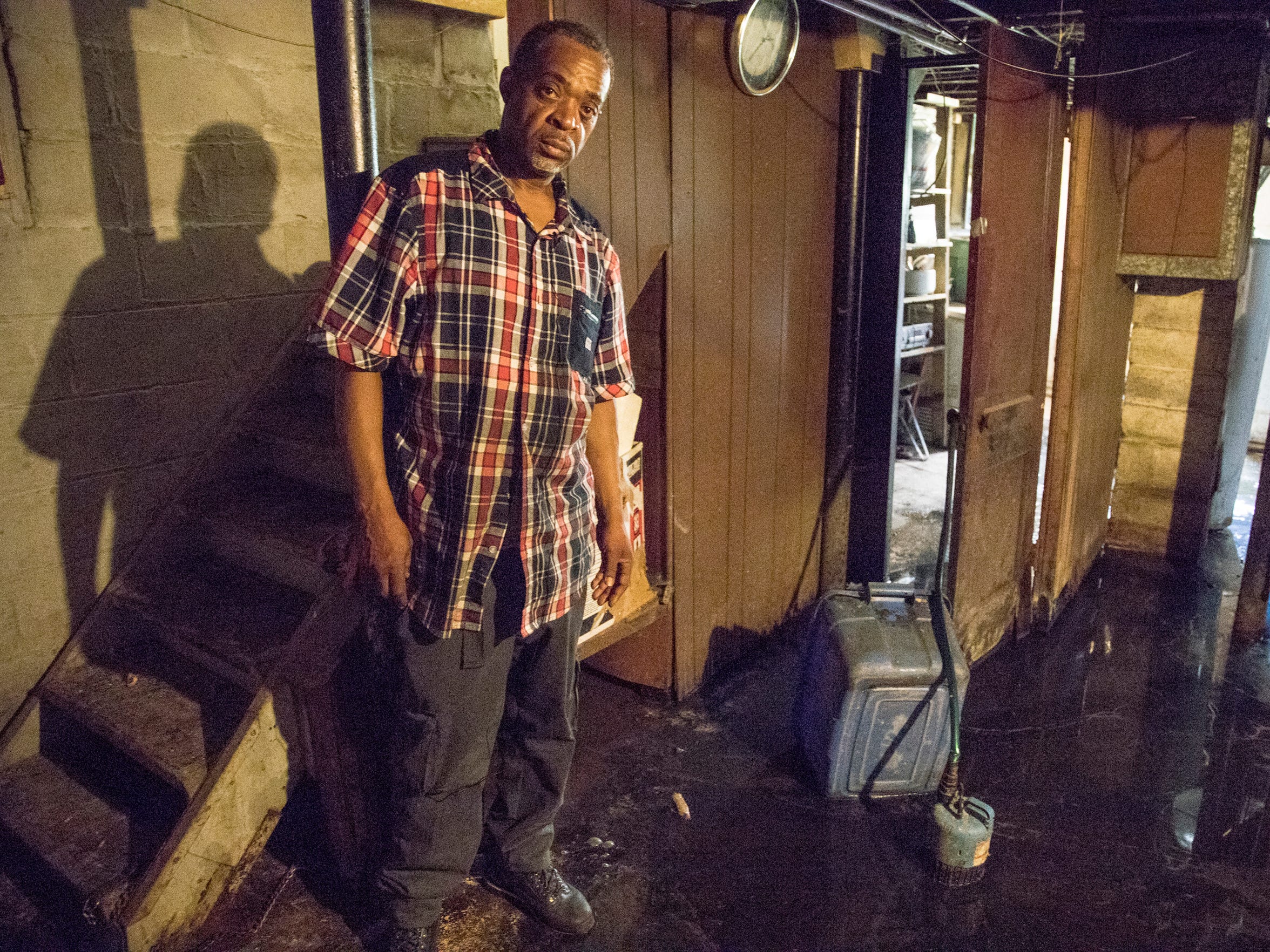 |
| William Love poses in May for a photo in the flooded basement of the house on Hull Street in Detroit that he is purchasing from the land bank. (Photo taken May 31, 2018) |
For Willliam Love, the buyback program will end the uncertainty in his life since he bought his two-story house on Hull Street near I-75 and 7 Mile Road from a family friend in 2013. Love said he later found out the seller hadn't paid the property taxes.
Love lost the property to foreclosure and the land bank became the owner in early 2015.
This spring, Love had a job at an auto parts manufacturer, had taken a financial literacy class and was on his way to buying the house for $1,000.
"Things are looking up for me," he said. "I feel better. A great deal of relief."
When he's once again the owner, Love is going to tackle an expensive plumbing problem: the cause of the water that seeps into his basement when it rains. And the ramshackle garage with the collapsed roof will be torn down.
Neighbors pick up the load
As Free Press reporters crisscrossed the city looking for squatters, they found neighbors of land bank houses taking it upon themselves to prevent squatters from moving in.
One woman, who did not want to be identified, claimed that for two years she has been maintaining the exterior of the two-story brick house next door to her west-side place on Petoskey Avenue near Livernois and the Lodge Freeway. The last occupant died.
To the Writer: That is Davison - I-96, not the Lodge Freeway.
To the Writer: That is Davison - I-96, not the Lodge Freeway.
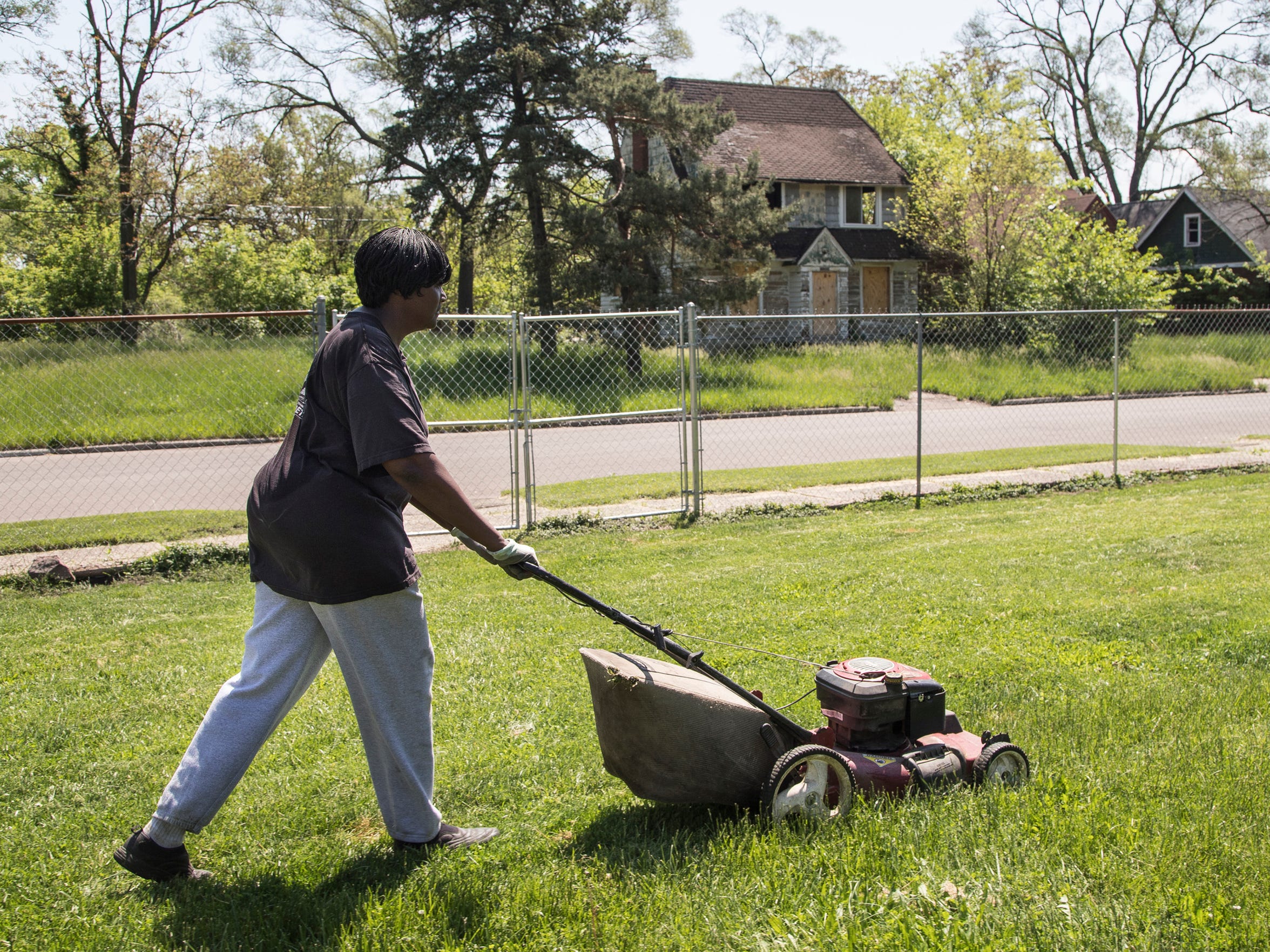 |
| Anna Hollins in May mows the yard of her Lauder Street home, which sits across from a land bank house investigated for possible dog fighting. (Photo taken May 25, 2018) |
On Lauder Street, near Hubbell and Grand River avenues on the west side, Anna Hollins lives next to a land bank house that she said is popular with squatters. Until recently, they were able to sneak in through a window she can't see from her house, by climbing a fallen tree limb.
The branch is now gone. But the squatters may still be getting inside.
As she showed a reporter the window, she glimpsed something in the grass: pennies.
She picked up a handful.
"You know someone's been around," she said. "Ain't no way in the world should be money over here."
She said she wants the land bank to tear down the house and sell her the lot.
A longtime member of the National Guard, Hollins keeps a close watch on the house because "I never know what I'm coming into."
Since 2014 through late January, the land bank opened 1,406 squatter investigations — the equivalent of almost one a day....through what investigative authority?
According to summaries of its 2017 investigations, obtained by the Free Press under the Freedom of Information Act, the land bank or the Detroit Police Department were called out 456 times to investigate suspected drug houses, illegal dumping, dog fighting, a chop shop, gang activity, prostitution and other questionable activity.
While one of the investigators was at a house on Charlevoix Street near Van Dyke and Mack on the east side, "an older man rode up on a bike looking for Toto," the terrier from Wizard of Oz. "He was trying to buy some drugs."
Another time on the east side, documents show, the investigator asked the occupant of a house on Maryland Street near Warren Avenue and Alter Road whether there was drug activity in the house. The occupant stated he just had a lot of friends.
"As I was standing there talking to him a car pulls up and asked for a bag of weed. I looked at him (and) laughed," the investigator wrote.
When police went to ticket a suspected drug house on Westphalia Street on the east side near State Fair and Schoenherr, the squatters ran out and officers found "dogs in basement, marijuana and stolen cars."
Last year across the city, police or the land bank also found guns, ammunition, illegal utility hookups, cash and lots of drugs — marijuana, heroin and cocaine, and scales to weigh it all.
One house, on Collingham Drive near Gratiot and 8 Mile on the northeast side, was the subject of 16 police runs during the first three months of 2017. And the property was the site of five fatal overdoses in five months.
In an April 2017 email to the land bank, Police Officer Brad Hawkins complained that the house was open to trespass.
"Narcotics users are bringing their narcotics to this location to get high," Hawkins said as he pleaded with the land bank to secure the house.
A month later, Hawkins called the land bank to report the fifth overdose resulting in death at the house since the first of the year. That same afternoon, the land bank dispatched a crew to secure the house.
"Great," responded a land bank lawyer in an email to colleagues. "Not sure what more can be done other than getting it sold & occupied." <=== text book example of a "Legal Genius" (trademark pending). If it was a legal entity, the Fraudfeasors of the Detroit Land Bank Authority could partner with community organizations or governmental programs through DHHS or HUD, but it never incorporated and, alas, is still under federal investigation of SIGTARP.
In May 2017, a complaint about a chop shop — a place where stolen cars are taken apart for parts — took an investigator to a house on Bradford near 7 Mile and Groesbeck. The Free Press went there and found a man in a car in the driveway on a Friday afternoon. "Hell no," he said, no such thing happened at the house.
"I ain't doing that," the man said.
But he acknowledged that police seized 10 cars from him and his father and he got half of them back.
The man said he was fixing some of the cars, but others were sitting idle.
He said his father lives next door — but not at the moment. The father was actually somewhere else: the Macomb Correctional Facility, a state prison, for carrying a concealed weapon.
Back across town, across the street from Anna Hollins, the land bank investigated dog fighting on Lauder Street.
Hollins said she could hear the sounds of dogs fighting at the house, saw a dog wandering her street with rope around its neck and "all these marks." She said some nights, cars would line her street, which is pockmarked with vacant houses and empty lots.
"I've actually seen dogs going in and out of there, like it was their house," she said.
Squatters have their own stories
When the land bank dispatches its investigators to check on squatter complaints, they ask the occupants how they came to be in the house. Were they former renters, owners?
Some squatters give suspicious answers.
During one such check, an occupant of a house on Wisconsin Street on the west side said he had permission to be there from the aunt of a friend named Will. Later, the occupant said it was Will’s mother who gave the OK. But he didn't know the women's names. He said he didn't know Will's last name, either.
Another occupant on Saratoga Avenue near 7 Mile and Gratiot said she couldn't remember the name of her landlord and when she spoke with a land bank employee on the phone, she paused before answering each question "as if someone was feeding her the answers. ... Her story seems suspect."
I have a great idea! We can take affidavits and depose these people to the grand jury so their stories are in the historic record.
I have a great idea! We can take affidavits and depose these people to the grand jury so their stories are in the historic record.
50 bodies
From 2014 through January, Detroit police have investigated the homicides of at least 50 people whose bodies were found on or near land bank properties. They've found bodies inside land bank houses, on a front porch, hidden in overgrown grass and weeds, slumped over in vehicles, and one concealed by branches and brush — a woman with a hole in her chin.
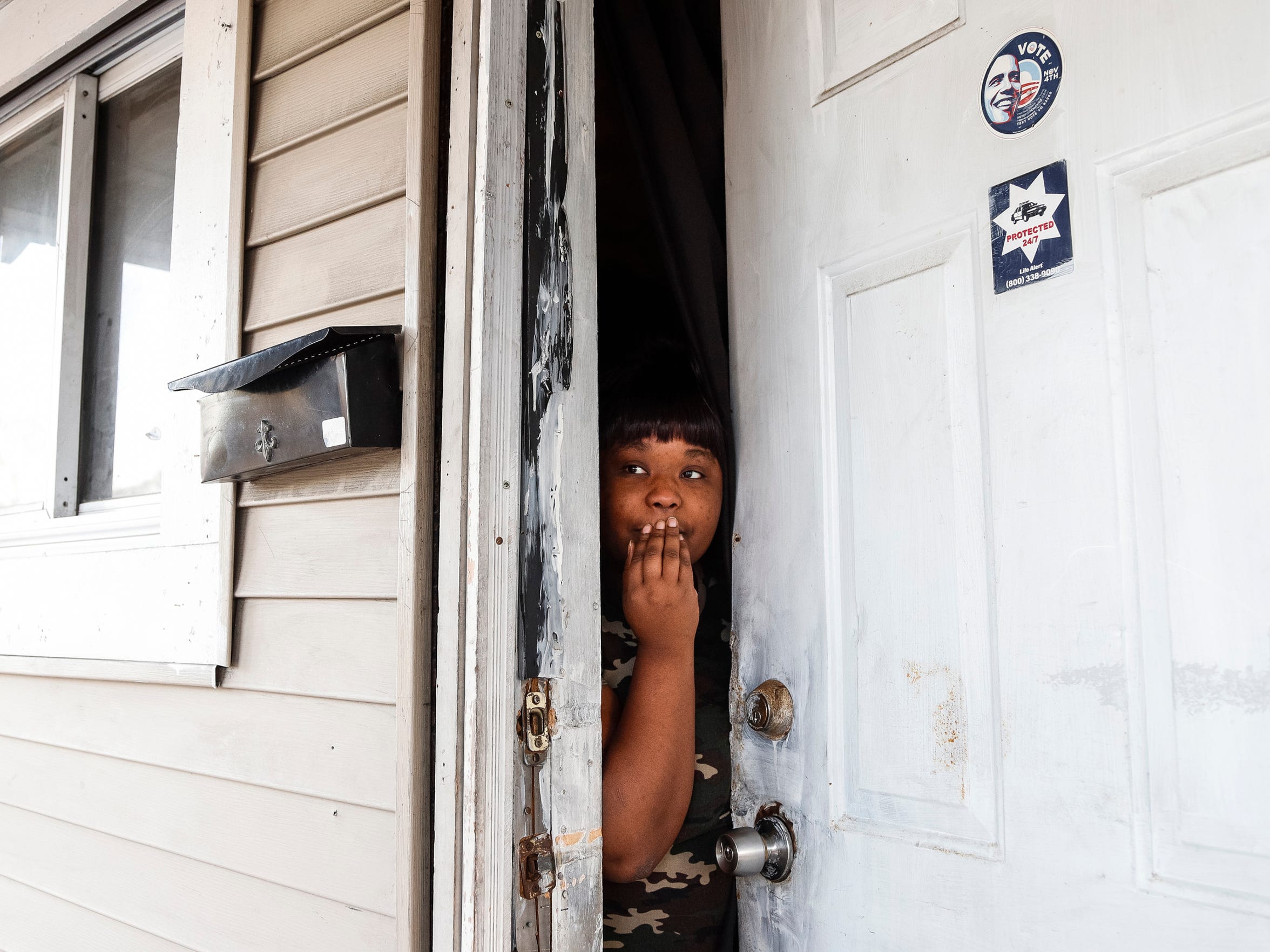 |
| Pauletta Lawrence talks to the Free Press in December from the door of a land bank house on Richton where Immanuel Foster, 7, was found tortured in 2014. The boy died. (Photo taken Dec. 20, 2017) |
Victims were shot, stabbed, strangled. One 7-year-old malnourished boy, Immanuel Foster, was tortured and later died. The land bank house where police found the boy beaten and burned is still standing — and it's occupied.
Gotta love the "Legal Geniuses" (trademark pending) and their disdain of "The Poors" (always said with clinched teeth).
The child's mother and her boyfriend were convicted of child abuse and involuntary manslaughter in the 2014 death. She was also convicted of torture and sentenced to a maximum of 50 years in prison; he got up to 15 years.
A woman who said she was the boyfriend's sister was in the house in December when the Free Press knocked on the door. Pauletta Lawrence said she thought her father owned the house. She said she had lights and heat, but no water, which she brings to the house in jugs.
She said she moved in to protect the house more than two years ago, "because a crackhead tried to break in and burn it down." That is the spirit of a soldier.
A squatter is also living in the house on Mendota Street where 45-year-old John Payne drove his Suburban onto the property after he had been shot in the middle of the night in October 2016.
When the Free Press visited the house near Grand River on the city's west side in May, a man named Reginald said the occupant was hospitalized, and he was just keeping an eye on the property for his friend, also Reginald.
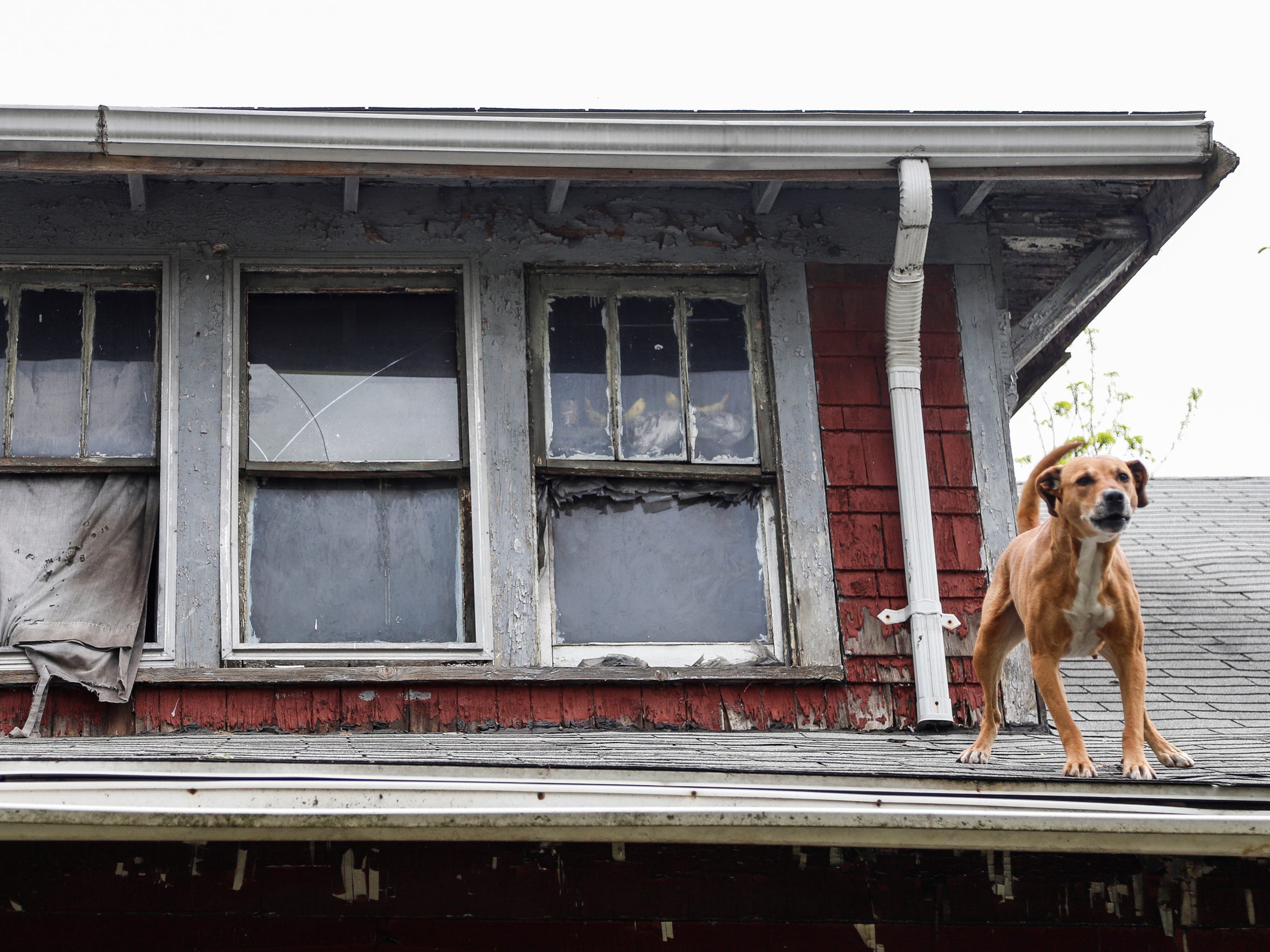 |
| Sugar, a dog that belongs to an occupant of a land bank house in the 11400 block of Mendota, stands on a roof after jumping out of the second floor window in May. (Photo taken May 10, 2018) |
As he described the night of the killing, a dog named Sugar leaped onto the roof of the porch through a second-story window, which was covered with a dingy sheet.
"That's an attack dog," he said. "Keeps people out."
Reginald said he doesn't have electricity or water — but he fills juice bottles with water at a friend's house. He has kerosene lamps, too.
The Fraudfeasors of the Detroit Land Bank Authority intentionally turned Detroit into a third world war zone through privatization.
A sign on the porch warns that "steps are bad" and "dog will bite!" It advises visitors to "stand at curb and yell."
"It's a crime every day around here," Reginald said. "It's a bad neighborhood."
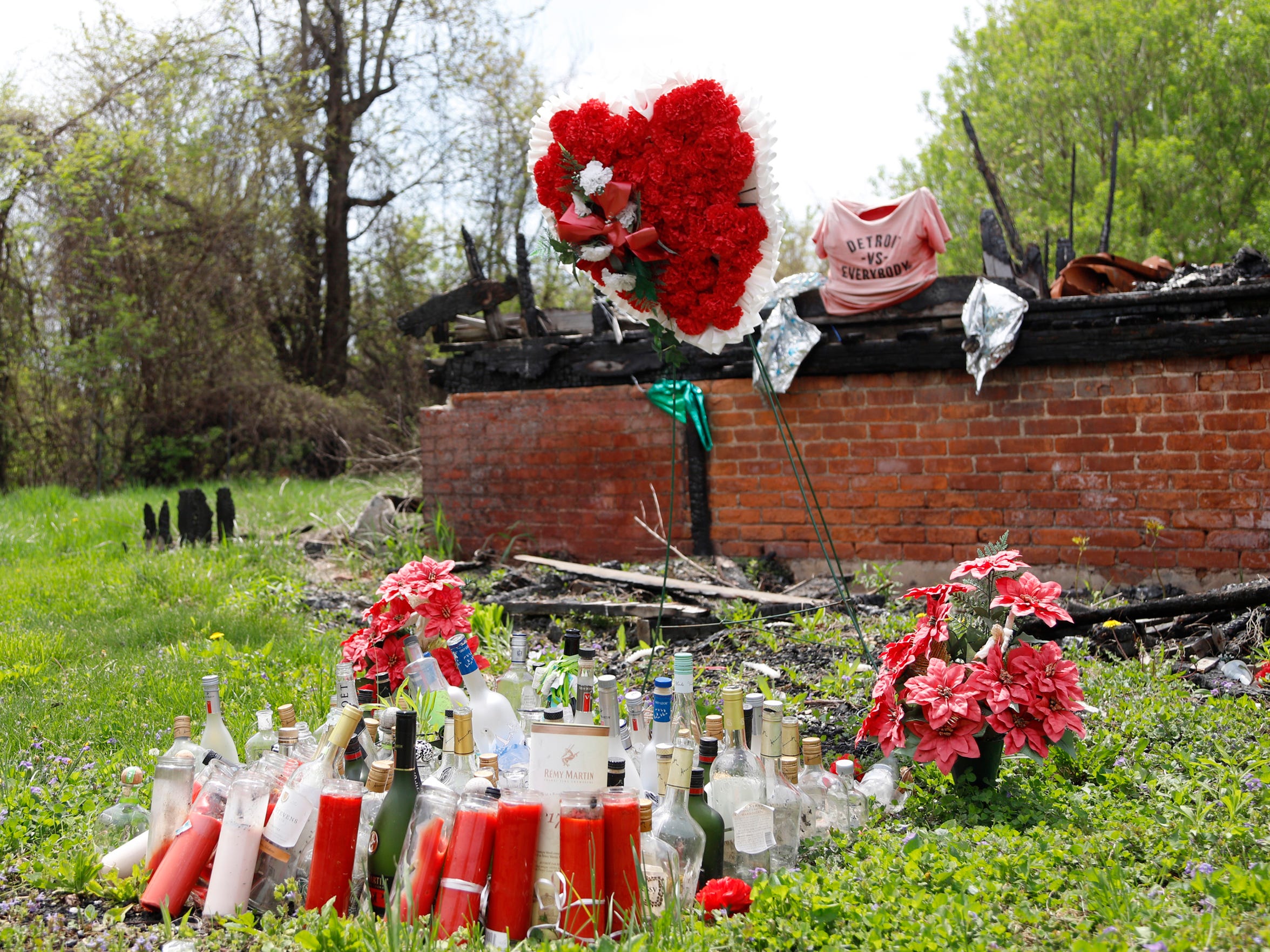 |
| A shrine outside of 5797 Garland Street, where Jevonta Malone, 26, was shot and killed in July 2016. (Photo taken May 9, 2018) |
Empty liquor bottles and glass candles sit in the grass beneath the shrine's heart of flowers on a stand, the kind displayed at funerals. Two pheasants alight in an empty lot.
Malone was killed during an argument "over a female," said his cousin, Enrico Davidson, who lives across the street. "Crazy."
Police found LaDiamond Myers' body, nude and stabbed multiple times, on a mattress on the floor of a land bank house on Braille Street near Lahser and Fenkell in June 2017. "There was old and new trauma to her body," according to the police report.
Neighbors told officers that Myers had four small children who had been in the west-side house with her body. The children, officers said in their report, "were in and out of the house unsupervised."
Prosecutors charged a neighbor, Willie Wilborn, with first-degree murder, but a judge dismissed the case, citing insufficient evidence.
On a May afternoon, the door to the house was wide open, revealing the detritus of a household: a mattress, bottles of pills, dishes, a laundry basket, diapers, an empty Faygo bottle, baby formula.
Flies everywhere...and still no one cares about Detroit being ranked #1 in child poverty, infant mortality, illiteracy... well, perhaps the major developers who have pulled out Detroit do.
Flies everywhere...and still no one cares about Detroit being ranked #1 in child poverty, infant mortality, illiteracy... well, perhaps the major developers who have pulled out Detroit do.
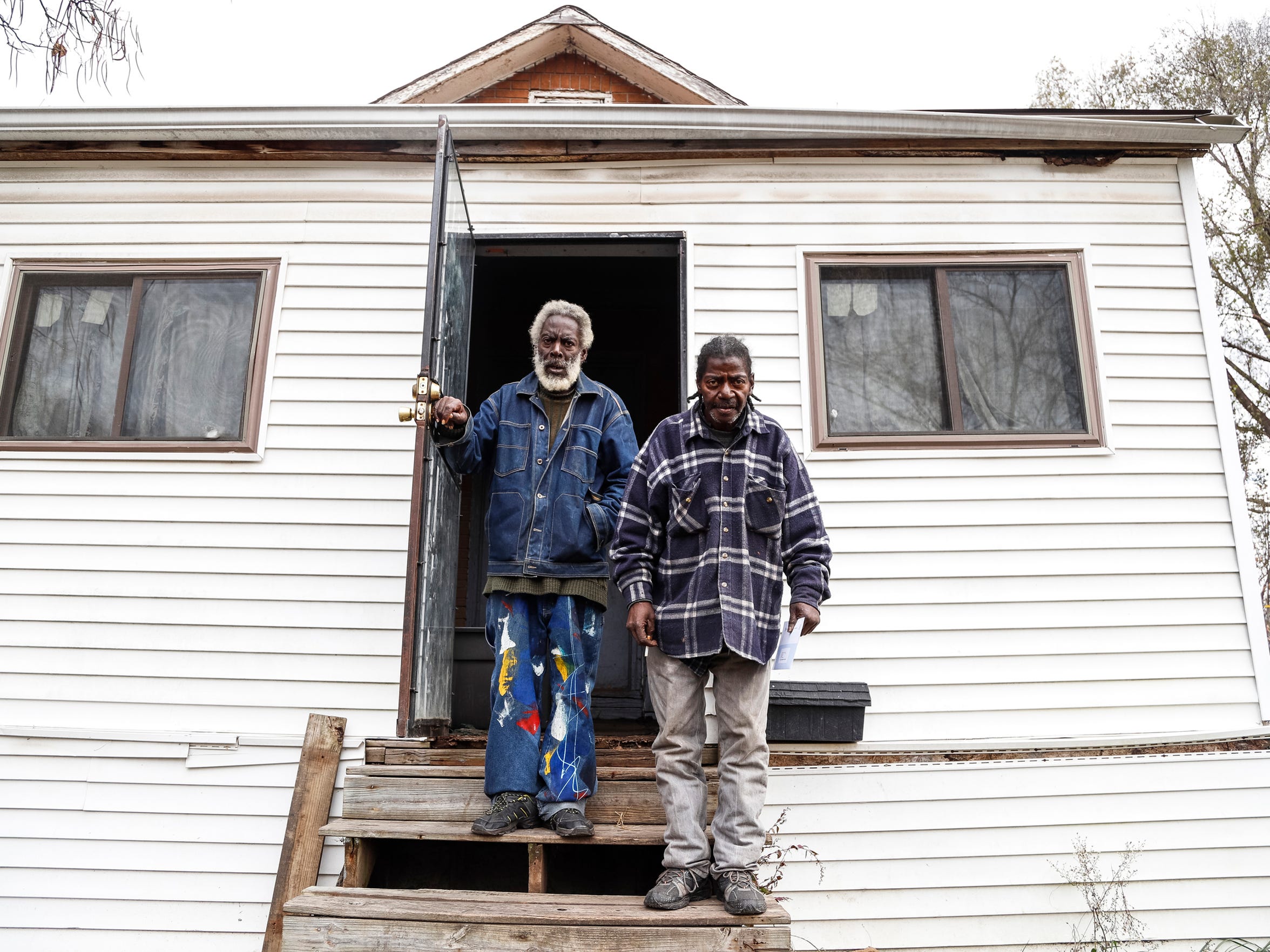 |
| Twins Wardell and Ordell Belt pose in November outside their home on Alpine Street in Detroit. (Photo taken Nov. 22, 2017) |
Alpine is squatter central. Once filled with families and children, it's a tattered neighborhood of small houses, many deserted, and vacant lots. There's hoarding and heartbreak on Alpine.
Twins Ordell and Wardell Belt share their house on Alpine with Scandalous, the lab-pit bull they adopted when they found him wandering the street. They said they have no central heat, no water.
Both get federal disability checks....Big $$$ Ballers with stability.
Both get federal disability checks....Big $$$ Ballers with stability.
The first time the Free Press met the Belts was the day before Thanksgiving, when Ordell came to the door with a cigarette in one hand, a bottle of Wild Irish Rose wine in the other.
Scandalous, just a puppy then, was chained up outside.
"He won't let anyone in the house when I'm in it," Ordell said.
Ordell has lived on Alpine almost all his life. He said he was shot by police when he was a teen. Shot in the chest, the side, his right leg, his left wrist (five times).
"I was doing s--t I shouldn't have been doing" on that day, Jan. 12, 1972. He won't elaborate.
Later that same year, Wardell went to state prison.
According to the twins, Wardell jumped a schoolteacher as a juvenile, escaped a state prison — he walked away from his inmate's job in a potato field — and robbed a bank with a gun.
How much did that robbery net?
"I ain't talking about it," he said.
Ordell and Wardell were born in June, under the zodiac sign of Gemini, the twins. This year, they turned 65.
Ordell knows almost everyone on his block: the animal lover at the end of the street, the brothers who live in their family home when they're not in jail, the young man who moved into his father's old house with dreams of bringing Alpine back to life, the goddaughter who helps him and Wardell with water.
Ordell bought his house in 1997 for $5,000, but stopped paying taxes and lost it to foreclosure in 2015. The land bank has owned it since 2016.
NOTE TO THE WRITER: You should really polish you journalism skills and go pull the court filings on the property. I guarantee that you will find fraud and you can report on it, too, or not, because you will probably lose your job if you equally report all facets of the Fraudfeasors activities and victims.
NOTE TO THE WRITER: You should really polish you journalism skills and go pull the court filings on the property. I guarantee that you will find fraud and you can report on it, too, or not, because you will probably lose your job if you equally report all facets of the Fraudfeasors activities and victims.
Yes, Ordell acknowledged, life is rough on Alpine. He said it was cold last winter. He stays in bed a lot.
"I don't have too much to do. Life is a struggle. Ain't got no water; it's hard to wash your body."
But he finds enjoyment, too, on Alpine. Reading his horoscope on his phone — "It told me I would be fortunate today," he said. Visiting with the young people who stop by the house.
"They all show me respect and love," he said.
Life isn't easy for Wardell either.
"I don't even wash up no more," Wardell said, showing the dirt on his forearms. "Just when I get my injection. I got to take the shot. It keeps me out of prison."
Ordell said there are days when Wardell talks a lot, others not so much. Some days Wardell might be feeling guilty that "he didn't get a chance to accomplish anything," Ordell said.
Wardell said he doesn't feel guilty about anything. He finds enjoyment on Alpine too, in going to the store for pound cake and candy, soda pop and bologna, and just sitting and relaxing.
He takes it easy, he said, because "I'm a sickly person. I have seizures."
Have no fear speculators of Detroit land! "Those Squatters" (said with disdain) shall soon be dead to the elements. Winter quickly approaches.
Have no fear speculators of Detroit land! "Those Squatters" (said with disdain) shall soon be dead to the elements. Winter quickly approaches.
Aquin Hill has lived on Alpine all her life, too.
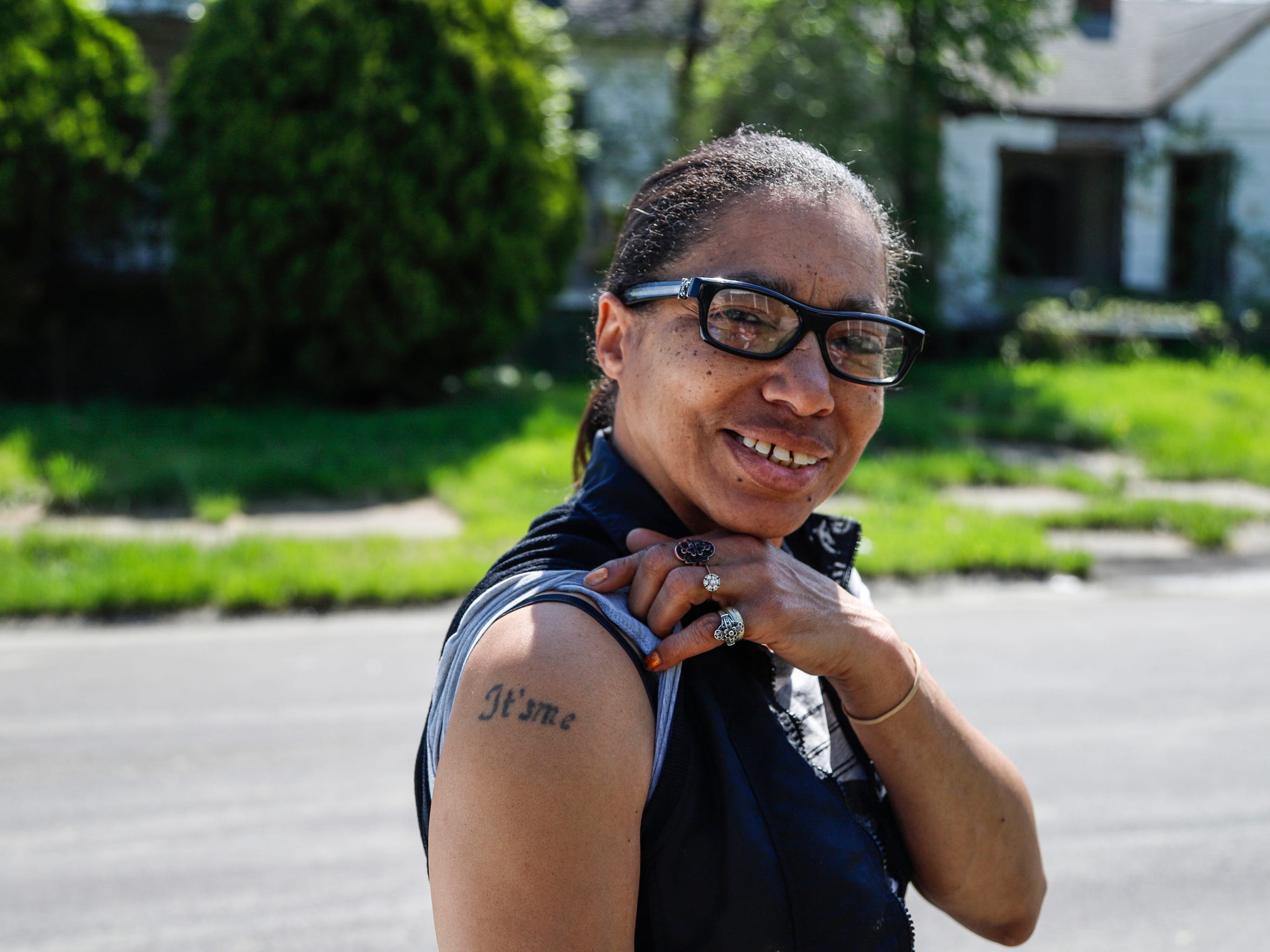 |
| Alpine Street resident Aquin Hill in May shows off a tattoo of her nickname on her right arm. (Photo taken May 17, 2018) |
The Free Press ran into Hill on a sunny May morning, walking down Alpine on her way to buy lottery tickets.
"I've got to hit those numbers right quick," she said. Sometimes, the only hope left comes in the form of hitting daily afternoon and evening numbers, just part of the rich tradition of Detroit that this Writer illuminates as the reason behind the despairing condition of "The Poors" (always said with clinched teeth).
Her mother gave Aquin her name after seeing "A Quinn Martin Production" on her TV screen. Her father gave Aquin her nickname: "It's me." She has it tattooed on her arm. Detroiters have pride and strength to survive the occupation of the Fraudfeasors.
Not far from Hill's home is the place where Georgeia Elder stays. She said she's living in a trailer, its roof draped with a blue tarp, with a man she met at a restaurant.
It's not romantic, between those two.
"I haven't been in a relationship for 15 years," she said. "We're just friends. My ex-husband is in Alabama."
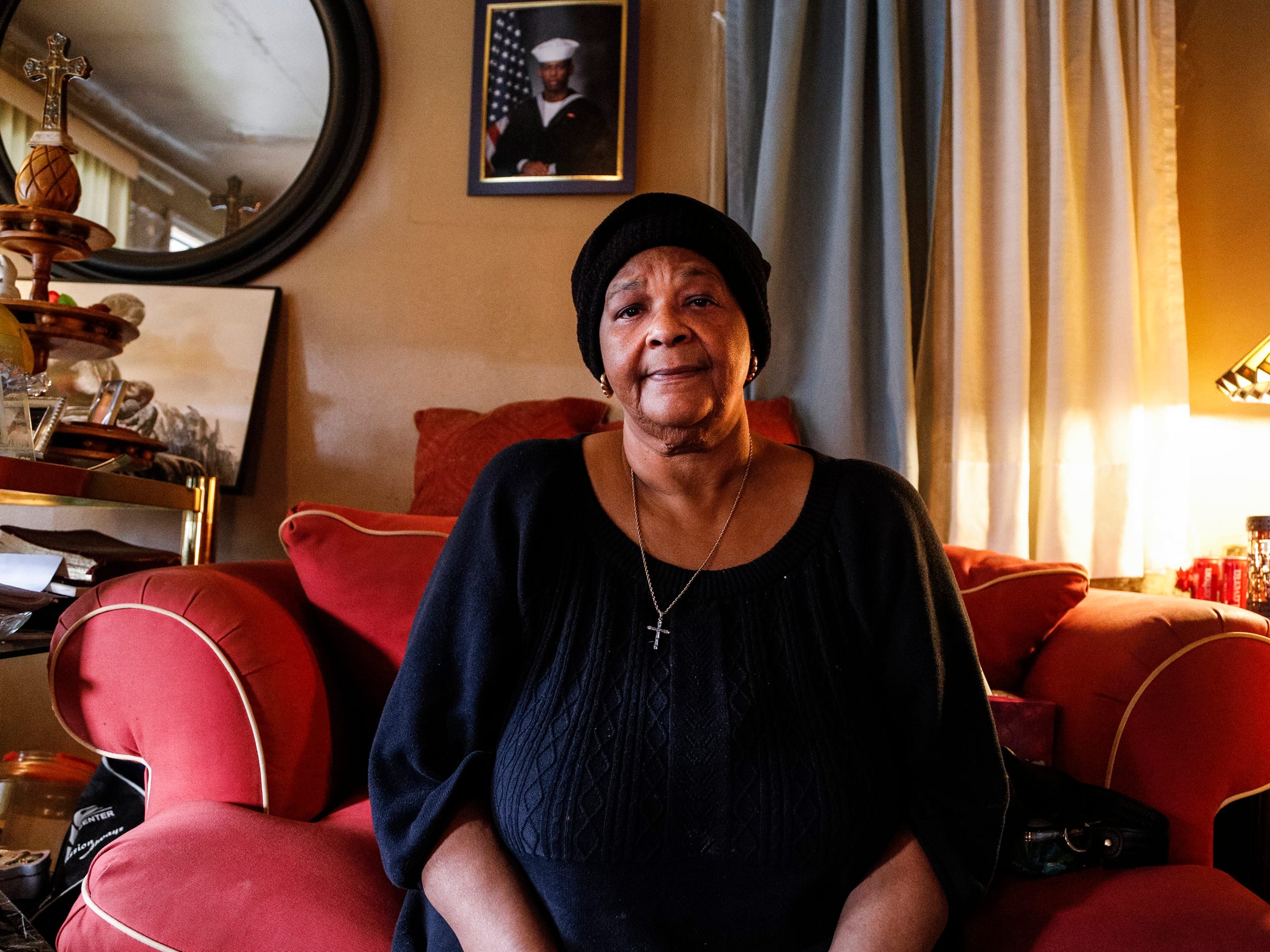 |
| LaVerta Washington poses in November inside the house she calls home on Alpine Street in Detroit. (Photo taken Nov. 22, 2017) |
Georgeia said people give her roommate things. She said she hasn't been in the land bank house.
"I don't know what all they've got in it."
LaVerta Washington said she has been part of the neighborhood since childhood, when she spent time with her aunt, who lived on Alpine. After her aunt died 17 years ago, Washington moved in.
She said she didn't have "any extra money" to pay the taxes and lost the house to foreclosure. The land bank took possession in early 2016.
"I was paying all the other bills but I just couldn't get it together when it was tax time," she said.
She said it's an uneasy feeling, knowing that she doesn't own the house. She worries she could lose it.
"I think about it when I go to sleep at night. I get down on my knees and pray about it. When I wake up I pray about it again. I say to myself, 'Lord, please don't let nobody put me out this house, find a way that I might be able to keep it,' " she said, overcome with emotion.
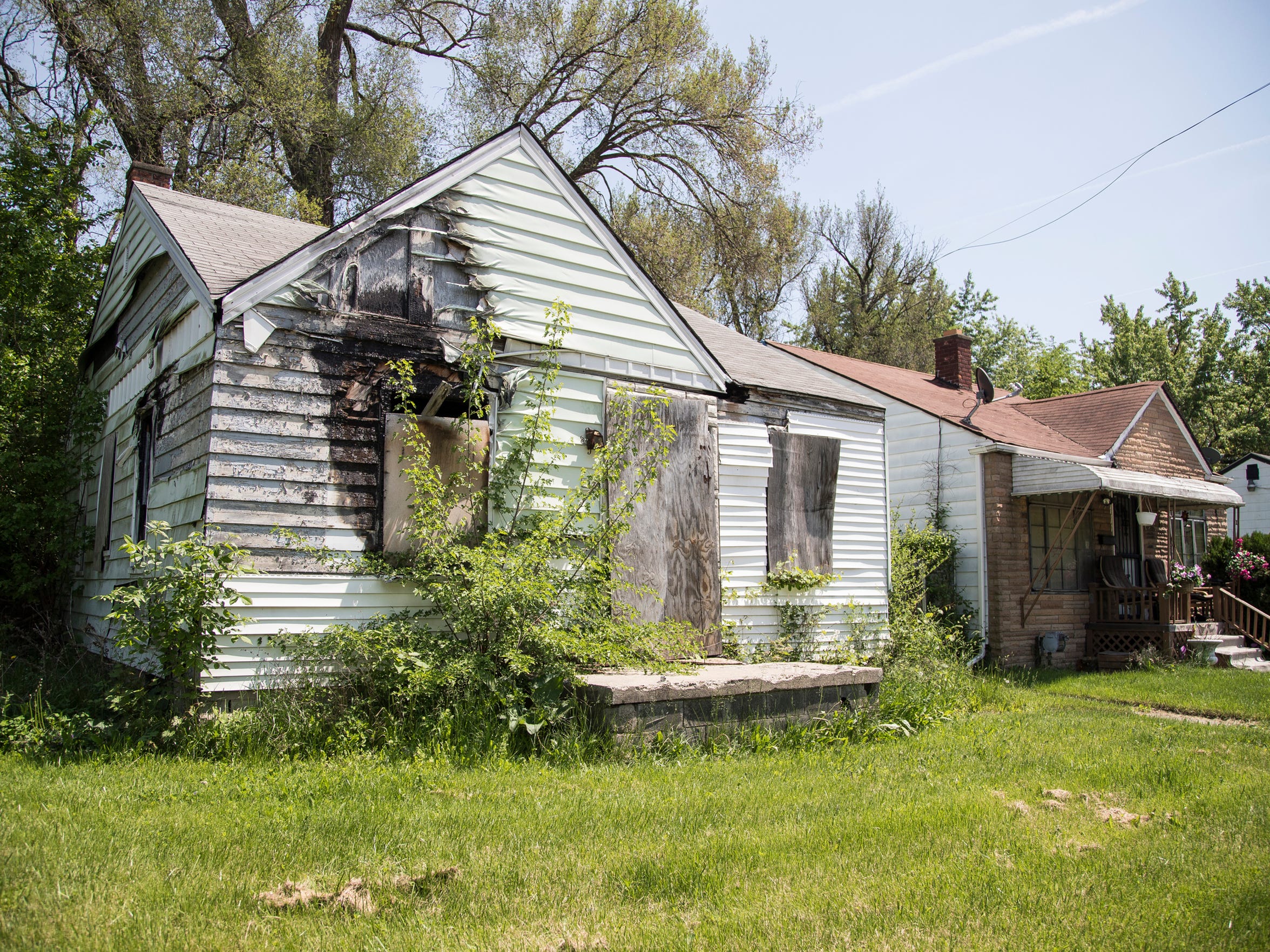 |
| A burned house next to LaVerta Washington's place on Alpine Street in Detroit. (Photo taken May 25, 2018) |
"I know the neighborhood isn't that good," she said in an interview in her small living room, decorated with family photos, a cross on the chain around her neck.
She ticks off the state of the houses that surround her: "Straight across the street is vacant. The one next door is vacant, they just walked out of that house. ... This one somebody firebombed it about a year ago," she said, pointing to another.
"I'm comfortable over here, and everybody knows me and I know everybody," she said.
Alpine is home.
"I really want to stay here until I die. I really do."
If the Fraudfeasors of the Detroit Land Bank Authority are not stopped very soon, LaVerta's death wish may come true sooner than later.
If the Fraudfeasors of the Detroit Land Bank Authority are not stopped very soon, LaVerta's death wish may come true sooner than later.
Voting is beautiful, be beautiful ~ vote.©
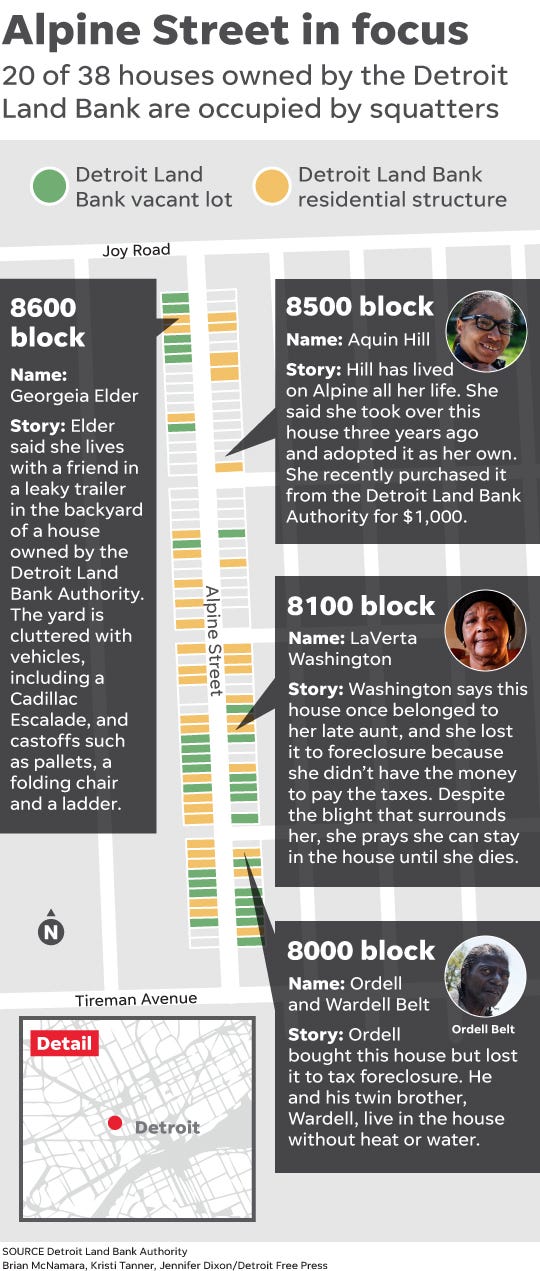

No comments:
Post a Comment